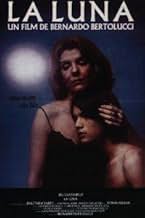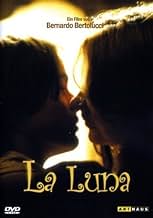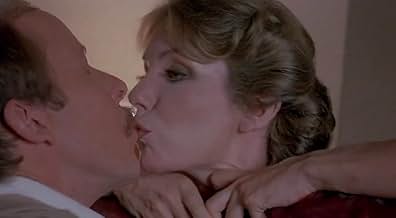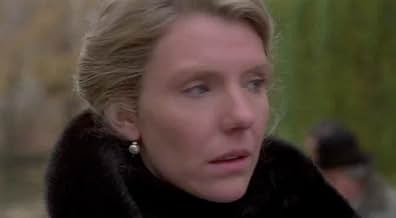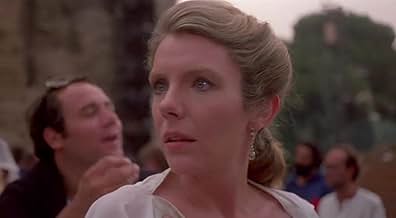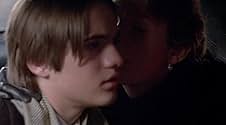IMDb-BEWERTUNG
6,4/10
5761
IHRE BEWERTUNG
Während einer Tournee in Italien hat eine kürzlich bekannt gewordene amerikanische Opernsängerin eine inzestuöse Beziehung zu ihrem 15-jährigen Sohn, um ihm zu helfen, seine Heroinabhängigke... Alles lesenWährend einer Tournee in Italien hat eine kürzlich bekannt gewordene amerikanische Opernsängerin eine inzestuöse Beziehung zu ihrem 15-jährigen Sohn, um ihm zu helfen, seine Heroinabhängigkeit zu überwinden.Während einer Tournee in Italien hat eine kürzlich bekannt gewordene amerikanische Opernsängerin eine inzestuöse Beziehung zu ihrem 15-jährigen Sohn, um ihm zu helfen, seine Heroinabhängigkeit zu überwinden.
- Auszeichnungen
- 1 Gewinn & 2 Nominierungen insgesamt
Mustapha Barat
- Mustafa
- (as Stéphane Barat)
Sara Di Nepi
- Concetta
- (as Shara Di Nepi)
Jole Silvani
- Wardrobe Mistress
- (as Iole Silvani)
Empfohlene Bewertungen
Jill Clayburg's acting was powerful and melodramatic as she attempts to use sex and herself to lure this disturbed son away from cocaine addiction. It gets almost pornographic and thereby uncomfortable to watch as the boy was only about 14. One could argue that he was an under-age actor who was being sexually exploited while Bertolucci was acting out some of his own problems while in psychoanalysis.
On the other hand, such movie-makers do the audience a service in bringing incestuous behavior and psychology to consciousness, where it lurks unconsciously in most people. Mother-son seductiveness is not that rare but is mostly denied and rationalized.
On the other hand, such movie-makers do the audience a service in bringing incestuous behavior and psychology to consciousness, where it lurks unconsciously in most people. Mother-son seductiveness is not that rare but is mostly denied and rationalized.
Not many discuss Bertolucci's La Luna as one of his most challenging films but I beg to differ. In 1979 I presume the film's campy allure had not been registered but today it's all to be seen; call it kitsch or ironic, but la Luna encapsulates two worlds Bertolucci tried to negotiate in most of his films - the world of appearances and surfaces against the inner world of the protagonist. La Luna plays both against each other as a masquerade, because what we think we are getting is not what we really are seeing. Bertolucci presents the first part as a post-Freudian fable in late 70s Rome where an Opera singer and her son indulge in an Oedipal relationship. Bertolucci then introduces the lost but real father to the scene as if to eradicate Freudian psychoanalysis as a spurious retelling of Greek myth. It seems the son only wants his father's recognition and love, while the mother is marginalized. It's a very masculine thesis for Bertolucci, one that reinforces the illusory fundamentals of Patriarchy, while negating the matriarchal as a mere bypass to the final journey(father's love).
Jill Clayburgh's acting is off-key most of the time but this unwittingly invests the film with its latter-day camp quality, while Matthew Barry looks dazed and confused throughout the entire film. Rome is undoubtedly the best part of the film as well as the sumptuous visuals that capture its sun-drenched beauty and decaying but grand monuments.
Jill Clayburgh's acting is off-key most of the time but this unwittingly invests the film with its latter-day camp quality, while Matthew Barry looks dazed and confused throughout the entire film. Rome is undoubtedly the best part of the film as well as the sumptuous visuals that capture its sun-drenched beauty and decaying but grand monuments.
Another memorably visual movie piece to add to this cult director's belt, and again, I was not disappointed, and more so appeased, as I really enjoyed this one, more than I thought I would, by some stretch. If you analyze the story, it actually makes sense. Let's face it, mother-son incest, is not too appealing, but this movie doesn't exploit, but more rationalize it, in a tame and poignant way. The wonderful Clayburgh, really carries this film, with such a roping performance, as a widowed mother and opera singer, who lost her husband (Gwynne) of all people, to a heart attack. She and young son, move to Italy, and it's not the best choice, as son merges with the wrong crowd of friends, and falls victim to heroin, supplied by a local town punk or playboy, who Clayburgh confronts later, and throws him an offer. Such a strong message is plastered across the screen about parent neglect, and we so much feel for the poor son, any mother would be proud to have, who's just drowning in a sea of self worthlessness, and there are moments, when we really hate Clayburgh's character, but we know why she has become, like this. The chosen locations of Italy are beautiful, especially the night shot ones. The opening scene, was beautifully shot and unexpecting, but totally pulled me in, part metaphor if you decide to watch this film , which I highly encourage you to do. Son and mother performance are equally impressive, and Clayburgh, is like a hot potato. You don't know how she'll react, and what she'll do next. The ending is mesmerizingly thought stirring, visually as well. I suggest you take a good look at La Luna. I'm glad I did. A stand alone, stylish, original treasure.
Not quite sure how I exactly feel about this film. As with a lot of Bertolucci movies, there are plenty of cringe-inducing moments, from the overblown Verdi opera scenes to Jill Clayburgh campily dancing around to rock music screeching "Oh yeah! In the 60s we believed in THINGS!!!" Taken as a whole, the movie is very uneven, psychologically muddled, heavy-handed and overlong. But there are haunting stretches in this movie which continue to resonate with me -- an opening passage where Clayburgh is biking in the night with her baby, and even smaller moments like the strangely beautiful shot of the teenagers skateboarding down the streets of Rome, or the kid dancing to "Night Fever". I would love to rewatch it and hope it get released on DVD. It's a fascinating entry in Bertolucci's work. A mess, but I think it's stayed with me more strongly than 1900 or Tango, though I think The Conformist still reigns supreme.
This is one of Bertolucci's best films. After the sudden death of his stepfather, whom he believes was his real father, the teenager Joe and his famous mother (played by Jill Clayburgh) depart for Italy. There, the unresolved enigma of his real father, his erotic attachment to his mother, the narcissism of the mother, and his own inability to truly connect with anybody else drive Joe into the world of heroin. His mother discovers his habit, and out of a combination of guilt and her own narcissistic loss of boundaries, first colludes with him to procure the drug, and then attempts to soothe him in his despair through sexual stimulation, and gets drawn into the Oedipal vortex into which Joe has plunged. This film demonstrates with great power the devastating consequences of the failure to resolve the Oedipal conflict. The film is difficult to find in America, but is well worth the effort.
Wusstest du schon
- WissenswertesThe movie was a Bertolucci family affair. Giovanni Bertolucci produced the film; Giuseppe Bertolucci was a writer and an uncredited 2nd assistant director; Lilletta Bertolucci was a unit publicist in Italy; Bernardo Bertolucci was a writer and director whilst his wife Clare Peploe was also a writer.
- Zitate
Joe Silveri: Your face is a mess. I'll clean it up.
[starts licking her face]
Caterina Silveri: It's good.
Joe Silveri: Hold still.
- Alternative VersionenAfter being banned in the Canadian province of Ontario. 20th century fox agreed to make cuts to 7 scenes showing incest and the film was given a 'Restricted' rating.
- SoundtracksNight Fever
Composed by Barry Gibb, Robin Gibb and Maurice Gibb
Performed by The Bee Gees
Courtesy of RSO Records Inc.
Top-Auswahl
Melde dich zum Bewerten an und greife auf die Watchlist für personalisierte Empfehlungen zu.
- How long is Luna?Powered by Alexa
Details
Zu dieser Seite beitragen
Bearbeitung vorschlagen oder fehlenden Inhalt hinzufügen


